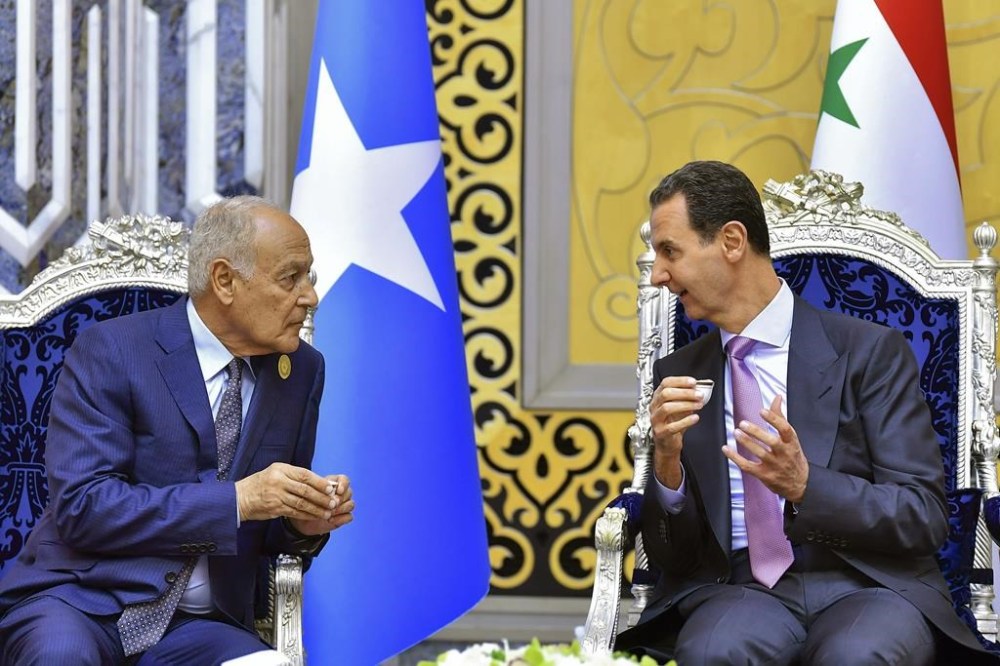Syria’s Assad arrives in Saudi Arabia for regional summit, sealing his return to the Arab fold
Advertisement
Read this article for free:
or
Already have an account? Log in here »
To continue reading, please subscribe:
Monthly Digital Subscription
$1 per week for 24 weeks*
- Enjoy unlimited reading on winnipegfreepress.com
- Read the E-Edition, our digital replica newspaper
- Access News Break, our award-winning app
- Play interactive puzzles
*Billed as $4.00 plus GST every four weeks. After 24 weeks, price increases to the regular rate of $19.00 plus GST every four weeks. Offer available to new and qualified returning subscribers only. Cancel any time.
Monthly Digital Subscription
$4.75/week*
- Enjoy unlimited reading on winnipegfreepress.com
- Read the E-Edition, our digital replica newspaper
- Access News Break, our award-winning app
- Play interactive puzzles
*Billed as $19 plus GST every four weeks. Cancel any time.
To continue reading, please subscribe:
Add Free Press access to your Brandon Sun subscription for only an additional
$1 for the first 4 weeks*
*Your next subscription payment will increase by $1.00 and you will be charged $16.99 plus GST for four weeks. After four weeks, your payment will increase to $23.99 plus GST every four weeks.
Read unlimited articles for free today:
or
Already have an account? Log in here »
Hey there, time traveller!
This article was published 18/05/2023 (895 days ago), so information in it may no longer be current.
JEDDAH, Saudi Arabia (AP) — Syrian President Bashar Assad arrived on Thursday in Saudi Arabia to attend a regional summit that is expected to seal Syria’s return to the Arab fold, marking his first visit to the oil-rich kingdom since Syria’s conflict began in 2011.
Assad’s attendance at the Arab League summit, which starts Friday, is a major step in normalizing relations following a 12-year suspension which saw the embattled leader turn toward non-Arab allies Iran and Russia to maintain his grip on power.
The 22-member league, which is convening in the Saudi city of Jeddah, recently reinstated Syria and is now poised to welcome Assad, once viewed as a regional pariah, back into its ranks. The Syrian president was officially invited to attend the summit last week.

Assad appeared relaxed and cheerful as he descended onto the tarmac, where he was greeted by Prince Badr bin Sultan, deputy governor of the shrine city Mecca, along with Arab League Secretary-General Ahmed Aboul Gheit and several local officials.
It was not immediately clear if Assad will meet some of the Arab leaders attending Friday’s summit. During Syria’s conflict, Assad only visited Russia and Iran and over the past two years he went to Oman and the United Arab Emirates.
Saudi Arabia was formerly key backer of armed opposition groups attempting to overthrow Assad. However, in recent months, Riyadh has called for dialogue to end the conflict that has killed half a million people and displaced half of Syria’s pre-war population.
Assad’s troops have taken control of much of Syria thanks to the support of Russia and Iran that helped tip the war in his favor.
Relations between Syria and Saudi Arabia had been turbulent since Assad took office in 2000, following the death of his late father and former president, Hafaz Assad. The two countries cut relations in 2012, at the height of Syria’s conflict. Last week they agreed on reopening their embassies.
In April, Syrian Foreign Minister Faisal Mekdad visited Riyadh and his Saudi counterpart, Prince Faisal bin Farhan, visited Damascus and met with Assad. Mekdad also took part in Arab foreign ministers meeting in Jeddah on Wednesday ahead of the summit.
Saudi Crown Prince Mohammed bin Salman has been pushing for peace in the region and over the past months, Riyadh has improved its relations with Iran, restored ties with Syria and is ending the kingdom’s yearslong war in Yemen. Iran, a main backer of the Syrian government in the country’s conflict, signed an agreement in China in March to resume relations with Saudi Arabia.
The renewed Saudi-Iran ties are expected to have positive effects on Middle East countries where the two support rival groups.
However, investments in war-torn Syria are unlikely as crippling Western sanctions against Assad’s government remain in place and could prevent oil-rich Arab countries from rushing to release reconstruction funds.

Washington has been strongly opposed to normalization of relations with Assad, saying a solution to Syria’s conflict based on U.N. Security Council resolutions should happen first.
Diplomatic contacts intensified between Damascus and Arab countries following the Feb. 6, earthquake that hit Turkey and Syria killing more than 50,000 people, including over 6,000 in Syria.
In addition to Saudi Arabia, Jordan and Egypt have also renewed ties with Damascus, following normalization efforts from the United Arab Emirates and Bahrain years ago.
Still, Kuwait, Morocco, and Qatar, remain opposed to normalizing relations with Syria and Qatar continues to be a key backer of Syrian rebel groups fighting Assad.
___
Associated Press writer Albert Aji in Damascus, Syria, contributed to this report.

